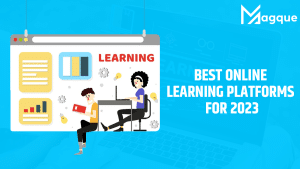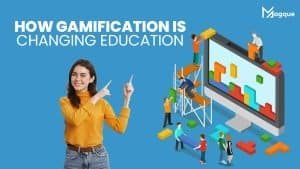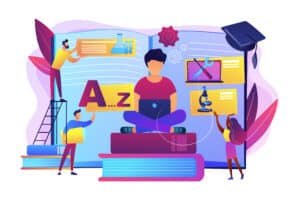Hey there, fellow knowledge-seeker! Today, let’s explore a fascinating topic shaping the future of education: technology. Yep, you heard it right! Gone are the days when education meant dusty chalkboards and heavy textbooks. In the 21st century, technology has become the ultimate game-changer, revolutionizing how we learn and teach.
Picture this: you’re sitting in a classroom, but instead of staring at a blackboard, you’re gazing at a sleek interactive whiteboard that beams with vibrant colors and dynamic visuals. That’s just the tip of the iceberg! Technology has opened up a whole new world of possibilities in education, making learning more engaging, accessible, and effective.
One of the most remarkable things about technology in education is its ability to cater to different learning styles. Whether you’re a visual learner who thrives on colorful infographics or an auditory learner who prefers podcasts and audio lectures, there’s something for everyone in the digital realm. With interactive simulations, virtual field trips, and personalized learning platforms, students can tailor their educational experience to suit their needs and preferences.
But wait, there’s more! Technology is transforming the way students learn and the role of educators. In the digital age, teachers are no longer just disseminators of information; they’re facilitators, mentors, and guides. With access to many online resources, collaborative tools, and learning management systems, educators can create dynamic, interactive lessons that inspire creativity, critical thinking, and student collaboration.
Let’s remember the global impact of technology on education. Thanks to the internet, students from all corners of the globe can connect, share ideas, and collaborate on projects like never before. Distance learning programs, online courses, and virtual classrooms have made education more accessible to those whom geographical barriers or financial constraints may have previously limited.
Of course, the discussion about technology in education would only be complete with mentioning the role of artificial intelligence (AI) and machine learning. These cutting-edge technologies have the potential to revolutionize the way we assess student progress, personalize learning experiences, and even predict future learning outcomes. Imagine a world where AI-powered tutors provide real-time feedback, adaptive learning algorithms adjust the pace and difficulty of lessons based on individual performance, and virtual reality simulations transport students to immersive learning environments.
So, what’s the bottom line? Technology isn’t just a tool; it’s a catalyst for change in the world of education. From interactive whiteboards to AI-powered tutors, the possibilities are endless. By embracing technology and harnessing its power, we can create a more inclusive, engaging, and practical learning experience for students everywhere. So, are you ready to join the revolution?
There you have it, folks! The role of technology in modern education is nothing short of revolutionary. So, the next time you’re browsing the web or tinkering with your smartphone, remember that technology isn’t just changing the way we live; it’s also shaping the future of education. Exciting. And be sure to explore Magque, your go-to source for the latest and most intriguing updates in the realms of informative tips & reviews!
FAQs
Q1. How does technology enhance learning in the classroom?
Technology enhances learning by providing interactive tools such as smart boards, educational apps, and multimedia resources that engage students and cater to different learning styles. It also facilitates collaboration among students and allows for personalized learning experiences.
Q2. What are the benefits of incorporating technology into education?
Incorporating technology into education offers numerous benefits, including improved student engagement, access to vast educational resources, enhanced collaboration and communication, and the ability to adapt instruction to meet individual student needs.
Q3. How does technology make education more accessible?
Technology makes education more accessible by breaking down geographical barriers through online learning platforms, providing resources for students with diverse learning needs, and offering flexible learning options such as asynchronous learning and remote access to educational materials.
Q4. What role does artificial intelligence (AI) play in modern education?
Artificial intelligence (AI) plays a significant role in modern education by offering personalized learning experiences, automating administrative tasks for educators, providing adaptive learning solutions, and enhancing assessment methods through data analysis and predictive analytics.
Q5. What challenges are associated with integrating technology into education?
Some challenges associated with integrating technology into education include access and equity issues, digital literacy gaps among students and educators, concerns about data privacy and security, the need for ongoing professional development, and the risk of technology replacing essential human interactions in the learning process.
Read Also This:- Virtual Classrooms: The Future of Education













